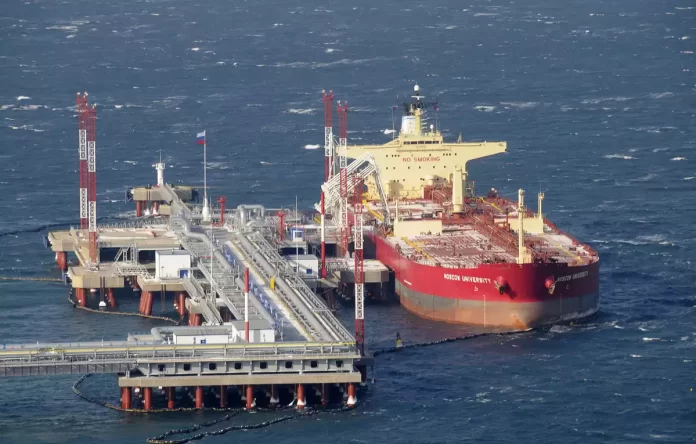According to ship tracking data and shipping fixtures, the US sanctioned 14 vessels on Friday, including three tankers that were scheduled to deliver crude oil to Indian refiners over the next few weeks. The US claimed that the Russian oil being transported exceeded the $60-per-barrel cap set by the West. The 14 vessels are ultimately owned by Sovcomflot, according to the US Department of the Treasury’s Office of Foreign Assets Control (OFAC).
According to ship tracking data, one of the tankers, Georgy Maslov, is expected to arrive at Sikka port later this week. The Sikka port is used by Reliance Industries (RIL), the biggest refiner in the private sector of India, to import crude. The Anatoly Kolodkin, another approved tanker, is slated to deliver crude to the Sikka port in April. Anatoly Kolodkin had delivered crude at the Vadinar port, which is near the refinery of Nayara Energy (NEL), earlier this month. The Vadinar port is used by both NEL and the massive state-owned refining company Indian Oil Corporation (IOC) to receive deliveries of crude oil. One of the fourteen tankers sanctioned on Friday, NS Captain, is scheduled to deliver oil to the Vadinar port in March and April.
Industry insiders do not expect any major issues with these specific deliveries because Washington has given the newly-approved tankers 45 days to offload crude oil. However, this is being seen as a sign that the US is tightening its regulations regarding the price cap, which was put in place by the Group of Seven (G7) countries and their allies in December 2022. The price cap’s stated goals are to prevent supply and price shocks, limit Russia’s oil revenue, and maintain a sufficient supply of oil on the global market. Considering that India receives approximately forty cargoes of Russian crude per month and that many tankers are involved in the Russian oil trade, it’s possible that the latest sanctions will have little effect on Russian oil flows.
Until the time of publication, RIL and IOC had not responded to requests for comments on the subject. In contrast, NEL had stated that the oil tankers referenced in the inquiry were not scheduled to deliver any crude oil to Nayara Energy. The Indian company Nayara Energy is dedicated to upholding all pertinent and applicable laws to the letter.
Industry sources say that after the 45-day period, Indian banks are unlikely to process payments for such cargoes and refiners will probably refuse to accept crude oil hauled on approved tankers. Indeed, Russian oil is purchased by Indian refiners on a delivered basis, meaning that the seller handles insurance and freight and the Indian buyers pay the total landed price of the oil. Furthermore, India has not ratified the price cap regime and has even expressed disapproval of the cap’s discriminatory nature, focusing only on Russian crude transported by sea and excluding oil transported via pipelines to other regions.
However, sources said that in order to prevent secondary sanctions themselves, the government does not want Indian refiners to blatantly disregard the G7 price cap or accept deliveries on sanctioned tankers. In the last few months, there have been cases where US sanctions against tankers bound for India were imposed due to price cap evasion; as a result, Indian refiners declined to take the cargoes.
Beyond that, though, the Indian government has insisted that purchasing cheaper Russian oil has benefited India’s energy security and shouldn’t be viewed through a geopolitical prism. Actually, the foreign energy markets are now more balanced and stable as a result of India’s massive purchases of Russian crude, according to Ministers of Petroleum and External Affairs Hardeep Singh Puri and S Jaishankar, and there is less severe price and supply volatility.
In response to Moscow’s invasion of Ukraine in February 2022, Indian refiners increased their purchases of Russian oil. Indian refiners seized upon Russia’s steep discounts on crude oil as the West began to wean itself off of Russian energy supplies. Russia was not a major supplier of oil to India until the conflict in Ukraine, but it is currently the country’s main source of crude. India is the third-biggest user of crude oil in the world, and more than 85% of its needs are imported.





























